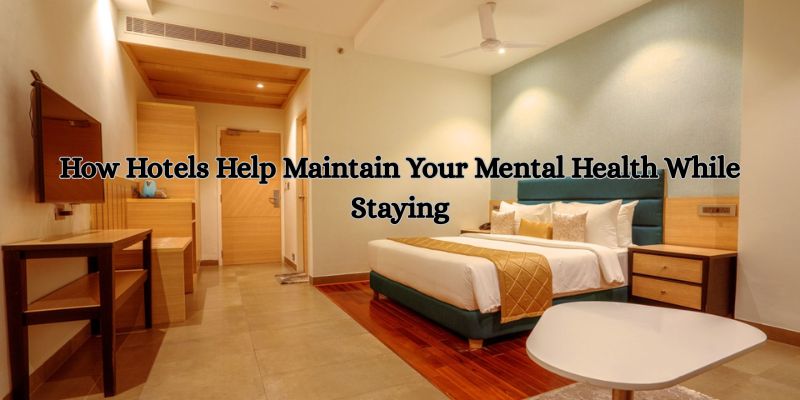
Traveling for business or pleasure usually involves taking a break from the normal routine. Perhaps one of the most important considerations in a traveler’s overall stay is the type of accommodation that is selected. Hotels are central to providing comfort, relaxation, and peace of mind while on a stay. In addition to serving as a bed for sleeping, they play an important part in maintaining mental health in a variety of ways.
A Change of Environment for Mental Refreshment
Entering a new environment is refreshing. The atmosphere of a well-planned hotels in Chennai T Nagar provides a feeling of relaxation that allows visitors to disconnect from the stresses of daily life. The interior, lighting, and general atmosphere within hotel rooms are frequently designed to induce calmness and serenity, providing guests with a welcome mental reboot.
Comfort and Stress Reduction
Hotels aim to provide comfort, from the warm bedding to air-conditioned rooms. Sound sleep is imperative for mental health, and a number of hotels go the extra mile to make sure visitors can enjoy quality sleep. Good night sleep has a positive impact on mood, thinking, and reducing stress.
Disengaging from Daily Responsibilities
One of the causes of daily stress is doing household chores, cooking, and job duties. A hotel stay obliterates these chores, giving visitors a time-out from daily routines. Relief from temporary stress can reduce stress levels and enhance well-being.
Quiet and Private Spaces for Reflection
Hotels tend to offer areas that allow visitors to have some aloneness, either in rooms, gardens, or specific quiet areas. These enable people to think, contemplate, or appreciate some time of solitude without being pressured by other factors, good for mental insight and emotional composure.
Well-Crafted Workplaces for a Balancing Stay
For the business or work traveler, hotels provide designated work areas in rooms or business lounges. These areas allow for work to continue without overwhelming the senses, providing a balanced experience between rest and work. Properly structured space is less likely to induce work-related stress.
Recreational and Wellness Facilities
Hotels tend to have facilities such as swimming pools, gyms, and yoga rooms that facilitate guests’ physical activity. Exercising tends to increase levels of endorphins, a natural pain-relieving substance which in turn de-stresses a person and general mental well-being. Participation in these activities helps improve mood as well as elicit feelings of achievement.
Being close to Nature
Certain hotels use green areas, rooftop gardens, rooms near US consulate Chennai providing a natural surroundings view. Contact with nature is shown to reduce stress, decrease blood pressure, and enhance mood. From the calm garden to the beach to a rural stay, nature becomes important for relaxing one’s mind.
Social Interaction and Community Feeling
Hotels offer the chance for social interaction, be it through lounges, dining rooms, or group events. Meeting others and chatting can ease loneliness and give a sense of belonging. Human contact is a basic part of mental health, and hotels build environments that facilitate these interactions.
Mindfulness and Meditation Opportunities
Certain hotels provide guided meditation or yoga classes that assist visitors in being mindful. Stopping for a few minutes to concentrate on the present can lower anxiety, improve concentration, and balance emotions. These activities are part of a calm and rewarding stay.
Personalized Experiences for Emotional Comfort
Most hotels concentrate on making a guest’s stay individualized by attending to a particular taste. Be it a tailored meal, desired room conditions, or special provisions for recreation, these minor details can contribute to enhanced emotional health by helping guests feel special and looked after.
Safety and Security for Peace of Mind
Feeling safe is essential for relaxation. Hotels provide 24/7 security, surveillance, and secure room access to make guests feel secure during their stay. Having the assurance that safety comes first makes guests able to relax and enjoy their stay to the fullest without needlessly worrying.
Memorable Experiences and Emotional Well-being
A good hotel experience leaves memories. Whether it is a scenic view, good hospitality, or participating in a new activity, these experiences lead to happiness and emotional fulfillment. A satisfying stay can have a long-term positive effect on mental well-being.
Hotels make important contributions to mental health through comfort, relaxation, and personal development opportunities. However it is achieved — through a good night’s sleep, healthy diet, leisure activities, or even a serene atmosphere — staying at a hotel has various psychological advantages. The proper accommodation choice can be the key to an enjoyable and rejuvenating mental experience. Prioritizing well-being on the road not only improves the stay but has long-term beneficial effects on general mental health.